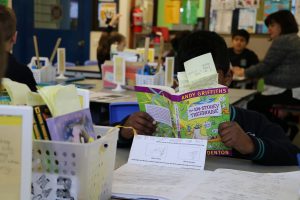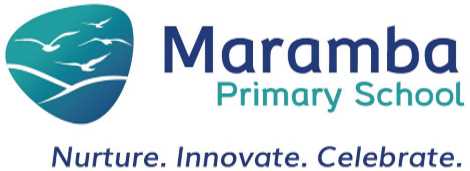 At Maramba, students are encouraged to develop a love of books, both fiction and non-fiction.
At Maramba, students are encouraged to develop a love of books, both fiction and non-fiction.
We use a combination of a “Readers’ Workshop” model and guided reading for our literacy sessions. This model encourages students to become independent and engaged readers who consciously interact and critically think about the texts they read. Students are taught that they have two voices- a speaking voice and thinking voice. Students are encouraged to tune into their thinking voice and record their thinking before, during and after they read. We teach our students the ‘language of thinking’. The Readers’ Workshop model enhances the learning opportunities for all children and provides a common approach and language across the school.
The Readers' Workshop Model
- whole class – explicit teaching of a reading skill or comprehension strategy;
- students from Foundation – Year 6 are gradually and sequentially introduced to the main reading powers (comprehension strategies/reading skills) that ‘Good Readers’ use.
These are:
- Making connections – Text-self, text-text and text to world. Students have a wealth of experiences they can bring to their reading
- Questioning- Asking questions (literal and inferential) to deepen meaning and clarify understanding, before, during and after reading
- Predicting– Finding clues and thinking about what they know (pictures and words), what will come next?
- Visualising and Sensing – Making a picture/movie in mind
- Making Inferences – Being word detectives (thinking about word meaning) and reading between the lines
- Summarising and determining importance – Finding key text, main idea and remembering them
- Transforming – How our thinking changes throughout a text
- Zooming into non-fiction text– Looking at the specific features of information texts.
In the junior years, students are taught using both a phonic (letters and sounds) and whole language approach (words) as we understand that individual children learn in different ways. Decoding of words and comprehension are taught side by side from Foundation onwards.
Guided Reading
During these sessions, small groups of students read a teacher directed text to revise the focus reading skill or comprehension strategy with the support of the teacher and each other. The teacher will also use this time to focus on the explicit needs of individual students.
Independent Reading Routine
Students are given opportunities to make appropriate choices in book selection and taught how to select books that are “Just Right” for their ability, catering for interest and different levels of ability.
From Foundation to Year 2, the emphasis is on providing guided support, gradually increasing independence in Years 3 to 6 by allowing time for students to practice their reading skills/ comprehension strategies during the independent reading routine component of literacy sessions.
Assessing Reading Development
Individual Conferencing
Teachers conduct frequent conferences with students, taking notes on achievements and focus areas students need to work on. One learning goal is communicated to students at a time and followed up in the next conference. The focus may then stay the same or be changed according to their individual needs. This may be fluency, decoding skills, or a particular comprehension strategy etc. In upper year groups, conferences may be conducted in small groups with a single focus i.e. the ability to infer character traits.
Assessment for and of Learning
All children have the opportunity to achieve success with regular monitoring and assessment used to set goals at their level so they can achieve their personal best.
Types of assessment used:
- Probe
- ABLES
- PM benchmarking
- Standardised assessments
The Premiers Reading Challenge encourages all children to read and record their progress is an annual activity throughout the school.
